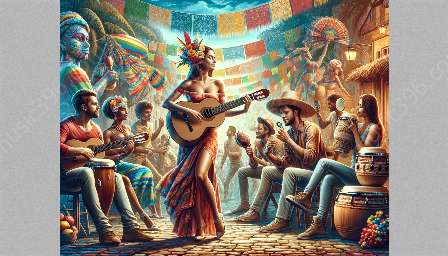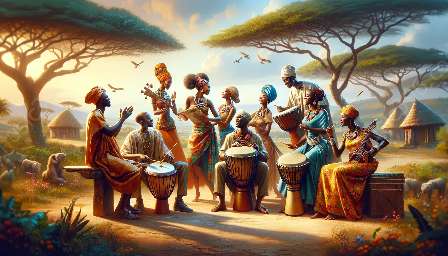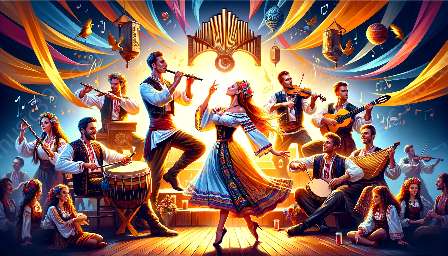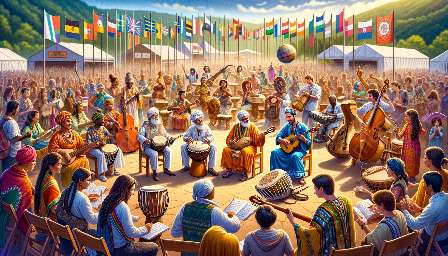Reggae music and Rastafarianism share a deeply intertwined history that has significantly influenced the Caribbean music and world music scenes. The two are interconnected through their cultural and spiritual roots, and have had a profound impact on society and music. This topic cluster explores the connection between reggae and Rastafarianism, their origins, philosophies, and influence on music and society.
The Roots of Reggae and Rastafarianism
Reggae music is a genre that originated in Jamaica in the late 1960s and is defined by its distinctive rhythmic patterns and socially conscious lyrics. It is known for its upbeat and laid-back style, characterized by offbeat accents and syncopated rhythms. The genre developed from earlier styles such as ska and rocksteady, and is strongly associated with the Rastafarian movement.
Rastafarianism is a spiritual and social movement that emerged in Jamaica in the 1930s, drawing inspiration from the teachings of Marcus Garvey and the Ethiopian emperor Haile Selassie I. Rastafarians believe in the divinity of Haile Selassie I, whom they regard as the messiah, and promote ideals of unity, equality, and social justice. The movement advocates for the repatriation of people of African descent to Africa and denounces the oppression and exploitation of black people worldwide.
The Influence of Rastafarianism on Reggae
The philosophy and beliefs of Rastafarianism have had a profound impact on the themes and lyrics of reggae music. Many reggae artists draw from Rastafarian ideology, incorporating messages of spirituality, social activism, and African identity into their songs. The music often serves as a platform for expressing the Rastafarian principles of peace, love, and unity, as well as addressing issues of inequality, poverty, and political corruption.
Reggae musicians such as Bob Marley, Peter Tosh, and Burning Spear, among others, have been instrumental in promoting Rastafarianism and its values through their music. Their songs have become anthems for social change and have helped to spread awareness of Rastafarian beliefs on a global scale. These artists have also contributed to the international recognition and acceptance of reggae as a genre with deep cultural and spiritual roots.
Reggae, Rastafarianism, and the Caribbean Music Scene
In the Caribbean, the rhythms and melodies of reggae music are intertwined with the cultural and spiritual essence of Rastafarianism. The genre has become synonymous with the region and is deeply ingrained in the Caribbean music scene. Reggae festivals and concerts are popular events that draw locals and tourists alike, celebrating the music and the Rastafarian culture that it represents.
Rastafarianism and reggae have also influenced other Caribbean music genres, such as dancehall, ska, and dub, shaping the musical landscape and providing a platform for artists to express their cultural identity and social consciousness. The fusion of reggae and Rastafarianism has become an essential part of the Caribbean's cultural fabric, representing resilience, resistance, and the pursuit of freedom.
Reggae's Impact on World Music
Reggae's reach extends far beyond the Caribbean, as it has left an indelible mark on world music. The infectious rhythms and powerful messages of reggae have resonated with audiences worldwide, transcending geographical and cultural boundaries. The genre's association with Rastafarianism and its emphasis on spirituality and social justice have made it a potent force in shaping global music trends.
Reggae has influenced diverse musical genres, from punk and hip-hop to electronic and pop music, leaving an enduring legacy on the international music scene. Its ability to convey messages of hope, resistance, and unity has made it a powerful tool for social and political activism, inspiring artists and audiences around the world to strive for positive change.
In Conclusion
The connection between reggae music and Rastafarianism runs deep, intertwining cultural, spiritual, and musical elements that have significantly impacted the Caribbean music scene and influenced world music. This union has not only shaped the sounds and rhythms of reggae but has also imbued the genre with a powerful social and spiritual resonance that continues to reverberate globally.










































